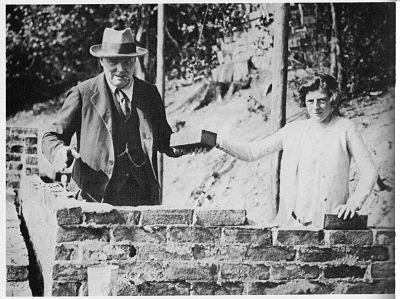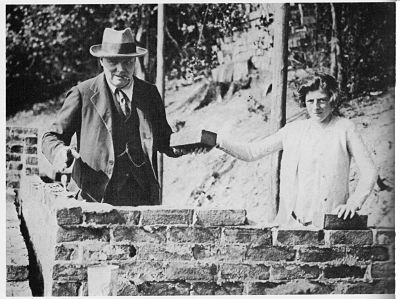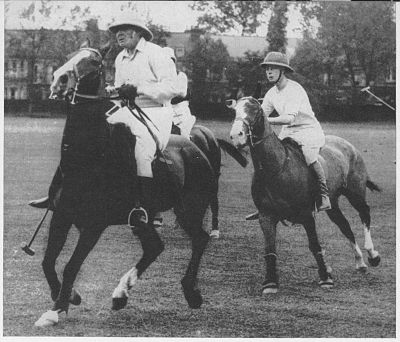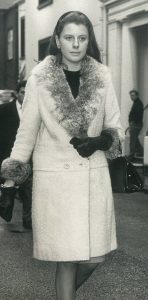
Finest Hour 166
Winston Churchill & Lessons for Business Leaders

July 24, 2015
Finest Hour 166, Winter 2015
Page 40
By David Freeman
 Like many homeowners, Churchill enjoyed the satisfaction of enhancing his property with his own two hands, whether it was tiling the roof or, as seen below with daughter Sarah during 1928, building a substantial wall around the vegetable garden of Chartwell. “To be really happy and really safe, one must have two or three hobbies, and they must all be real.”
Like many homeowners, Churchill enjoyed the satisfaction of enhancing his property with his own two hands, whether it was tiling the roof or, as seen below with daughter Sarah during 1928, building a substantial wall around the vegetable garden of Chartwell. “To be really happy and really safe, one must have two or three hobbies, and they must all be real.”
— Thoughts and Adventures
 Polo was more than sport for cavalry officers serving in India: “Rarely have I seen such strained faces on both sides. You would not have thought it was a game at all, but a matter of life and death. Far graver crises cause less keen emotion.” Writing in My Early Life on winning the Inter-Regimental Tournament of 1899. Pictured above in the 1920s playing with the Prince of Wales.
Polo was more than sport for cavalry officers serving in India: “Rarely have I seen such strained faces on both sides. You would not have thought it was a game at all, but a matter of life and death. Far graver crises cause less keen emotion.” Writing in My Early Life on winning the Inter-Regimental Tournament of 1899. Pictured above in the 1920s playing with the Prince of Wales.

2025 International Churchill Conference
As the man who organized Britain’s successful resistance to Nazi aggression during the Second World War, Winston Churchill proved himself to be one of the greatest leaders in history. Naturally, many look to his example for inspiration and guidance. While political leadership is somewhat different in character from business leadership, just as both differ in degrees from military leadership, there are common characteristics that can be successfully applied by leaders in all areas. Here are ten examples from Churchill’s career that deserve attention.
1. Build a Team
Churchill never tried to do everything himself. He recognized that others had talents that he did not possess, and he sought to utilize those talents to achieve his goals. Although Churchill himself never had the opportunity to attend a university, he did not hesitate to employ top university graduates on his personal staff. When he became Prime Minister during his nation’s darkest hour in 1940, he immediately formed a coalition government made up of leaders from all the major parties, whom he thought best suited to the task.
2. Communicate with Your Entire Team
Churchill is rightly remembered as a great speaker and writer. His speeches during the Second World War are credited with maintaining the national morale. He did not just communicate with his immediate staff and colleagues but with the entire nation. By treating everyone as an important part of the team and keeping them regularly informed about developments, he inspired people to give of their best.
3. Treat Everyone with Respect
In a long political career, Churchill had many bruising battles, but he did not take things personally. He always showed great courtesy to those with whom he had strong disagreements. Perhaps the most extreme example of this is found in the letter Churchill sent to the Japanese ambassador following the attacks on Hong Kong and Singapore, which caused Britain to declare war on Japan. Churchill signed off with the words, “I have the honour to be, with high consideration, Sir, Your obedient servant.” “Some people did not like this ceremonial style,” Churchill later recalled, “but after all when you have to kill a man it costs nothing to be polite.”
4. Accentuate the Positive, but Don’t Eliminate the Negative
When communicating with your team, don’t attempt to hide the bad. People will see through that and think you are a phony. Conversely, they respect you when you level with them completely. At the same time, you must also emphasize positive points on which everyone can build. Churchill’s first broadcast to the nation during the Second World War came after just one month of conflict. He began by noting the bad things that had happened and noting that the worst was yet to come. But he then went on to point out the bad things that had not happened and what steps the nation had already achieved and was then taking to prepare for the future.
5. Don’t Expect More of Others Than You Do of Yourself
Churchill drove his team very hard but no more than he drove himself. Working under great stress, he often snapped at those around him, but he always found some way to make it up to them by delivering a kind word here or a compliment there. Sometimes it took his wife Clementine to nudge him in that direction, but listening to your wife is also good advice for leaders!
6. Do Not Attempt to Do Too Much From a Subordinate Position
When you are a leader under a higher authority, you need to know and respect your operating limits. One of the great disasters of Churchill’s career was the Dardanelles campaign during the First World War. British forces attempted to capture the approaches to the Turkish capital. At the time the British army and navy were completely separate administrative units. There was no Minister of Defense or Combined Operations Commander to coordinate the fighting forces. As the minister responsible for the navy, Churchill attempted to fill the vacuum only to receive all the blame when the operation failed.
7. Don’t Be Afraid to Take Chances
“No really worth-while achievement would be possible,” Churchill observed, “if everyone adhered to ‘Safety First’ all the time.” Long before he became a famous war leader, he was proud to declare, “I always took chances!” Indeed, as an army officer, Churchill risked his life in four different wars. In politics he was not afraid to champion unpopular causes or to be fiercely criticized when standing for principles in which he firmly believed, such as warning against the Nazi danger in the years before the Second World War.
8. Make Suggestions and Accept Suggestions
During the War, Churchill sometimes drove his generals and admirals to distraction with new ideas he kept coming up with or learned about. Most of these did not prove practical, and he knew that would be the case. Yet he kept coming up with them because he also knew that a few at least might prove to be successful. At the same time, he listened to his professional advisers and accepted their advice when he was convinced that it was sound and well thought out.
9. Share the Credit
Churchill never failed to give others their due whether they were allies or adversaries. His memoirs are filled with tributes to those with whom he worked. Upon his eightieth birthday he was given a tribute of his own worthy of a great national leader, but he refused even then to take all the credit. “It was the nation and race dwelling all round the globe that had the lion heart,” Churchill insisted. “I had the luck to be called upon to give the roar.”
10. Take Time to Relax
“A man can wear out a particular part of his mind by continually using it and tiring it,” Churchill believed. “The cultivation of a hobby and new forms of interest is, therefore, of the first importance.” Churchill’s favorite pastime was painting, but he also enjoyed bricklaying. In his youth he played polo, in his later life, cards. Regular breaks from toil are necessary to refresh the mind and relax the spirit. Thus you will be prepared to face the new and continuing challenges.
Subscribe
WANT MORE?
Get the Churchill Bulletin delivered to your inbox once a month.





